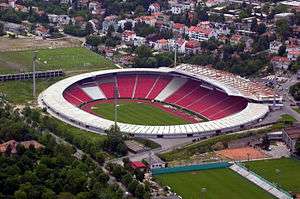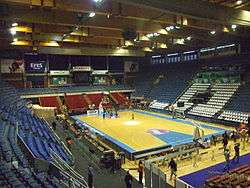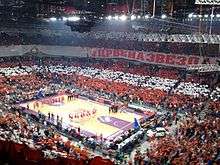Eternal derby (Serbia)
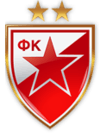 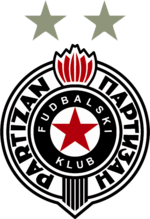 | |
| Other names | Derby of Southeast Europa |
|---|---|
| Locale |
Belgrade, |
| Teams | Red Star & Partizan |
| First meeting | 5 January 1947 |
| Latest meeting |
Partizan 1–0 Red Star 2016–17 Serbian SuperLiga (17 September 2016) |
| Next meeting | TBA |
| Statistics | |
| Meetings total |
Total: 240 Official: 152 |
| All-time series |
Official: |
| Largest victory |
Red Star 1–7 Partizan 1953–54 Yugoslav First League (6 December 1953) |
The Eternal derby (Serbian: Вечити дерби / Večiti derbi, French: Derby éternel, German: Das ewige Derby, Spanish: El Derby Eterno, Megaclássico, Italian: Derby Eterno), also called the Derby of Southeast Europe,[1] and Belgrade derby (Serbian: Београдски дерби / Beogradski derbi) is the local derby in Belgrade, Serbia, between fierce city rivals Red Star Belgrade and Partizan Belgrade, two of the biggest and most popular sports societies in Serbia. The rivalry is present in a number of different sports but the most intense matches are between football, basketball and handball sections of both societies. It started immediately after the creation of the two clubs in 1945 and the two clubs have been dominant in domestic football since then.
According to a 2007 survey, Red Star and Partizan are the most popular clubs in Serbia.[2] They also have many supporters in all other former Yugoslavian republics and in the Serbian diaspora.
In September 2009, British Daily Mail ranked the Eternal Belgrade derby 4th among the 10 greatest football rivalries of all time.[3] The highest attendance for a Red Star–Partizan match was about 108,000 spectators at the Red Star Stadium.
History
|
Both Red Star and Partizan originate in political institutions of the post-WW2 Communist Yugoslavia. Red Star was formed on 4 March 1945 by "United alliance of anti-fascist Youth", part of the new civil authority in Yugoslavia. A few months later, on 4 October 1945, Partizan was founded as the sports association of the Yugoslav People's Army. The first match between these football sections was played on 5 January 1947. Red Star won 4–3 and an intense rivalry has existed ever since. Partizan got its first win in the next derby. On 27 April 1947 Partizan won 1–0.
The derby replaced the pre-World War II rivalry between BSK Belgrade and SK Jugoslavija.[4] SK Jugoslavija was disbanded in 1945 and most of its property was attributed to the newly formed Red Star. BSK continued existing although changed its name a number of times being known since 1957 as OFK Beograd, and has lost its strength and its place in the derby to Partizan. Although OFK Beograd was successful, both Red Star and Partizan quickly overtook it in popularity.
Over time, from the purely athletic competition for the Yugoslavian Championship became a kind of power struggle between the Interior ministry and the Ministry of Defence. The two clubs were dominant in the post-1945 Yugoslav First League, with Red Star having won 19, and Partizan having won 11 Yugoslav championships. The clashes of these two against Hajduk Split and Dinamo Zagreb, the third and fourth respectively in number of national titles, were similarly intense. The four clubs were known as the big 4. After the break-up of Yugoslavia in 1992, the Belgrade derby further intensified, the two clubs having since then won all national titles except one, with Partizan winning a further 15 and Red Star winning 8 by 2016.
Supporters
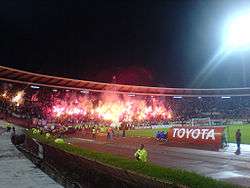
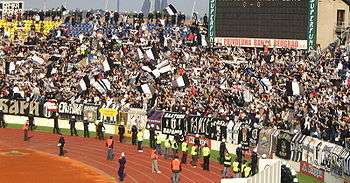
An important aspect of the Belgrade derby are the fans. Both sides prepare intensely between the matches, make large flags and special messages that are appropriate for that particular occasion, to be usually directed towards the opposing side.
Delije
Supporters of the various Red Star sports teams are known as Delije (Serbian Cyrillic: Делије, roughly translated to English as Heroes). The word Delije is plural of delija, a word of Turkish origin (deli) that entered the Serbian language during the Ottoman period, meaning brave, strong or handsome young man. The name Delije first began to be used by hardcore Red Star supporters during the late 1980s, with official inauguration taking place on 7 January 1989. Up to that point, the die-hard Red Star fans were scattered amongst 7–8 fan groups that shared the north stand at the Red Star Stadium (known colloquially as Marakana), most prominent of which were Red Devils, Zulu Warriors, and Ultras. As a sign of appreciation the club direction allowed the word Delije in block letters to be written across their stadium's north stand – the gathering point of the club's most loyal and passionate fans. They are also called Cigani (English: Gypsies) by their arch rivals Grobari, fans of Partizan. Although Delije generally consider the name Cigani to be insulting, they occasionally use this name in their own songs and chants. By 2010, Delije consist of four larger groups: Belgrade Boys, Ultra Boys, Heroes, and Brigate.
Grobari
Partizan's supporters, known as Grobari (Serbian Cyrillic: Гробари, Gravediggers or Undertakers), were formed in 1970. The origin of the nickname itself is uncertain, but an accepted theory is that it was given by their biggest rivals, the Red Star fans, referring to club's mostly black colours which were similar to the uniforms of cemetery undertakers. The other theory says that the name arrives from the Partizan's stadium street name, Humska (humka meaning "grave mound"), in actuality named after medieval land of Hum. The first groups of organized Partizan supporters began to visit the JNA stadium in the late 1950s. Partizan's participation in the 1966 European Cup Final attracted much more fans to the stadium and it is considered to be the point when the organized fans moved to the south stand of the stadium, where they gather to this day. During the 1970s the Grobari started bringing fan equipment to the stadiums such as supporting scarves, signs, banners and flares. By the 1980s the Grobari were one of the four main fan groups in SFR Yugoslavia and began touring all Partizan's matches across the country and Europe. Because of their expressed hooliganism toward other clubs' supporters in those times, fans who represented the core of the Grobari firm were often called among themselves "Riot Squad". They were best known for their English style of supporting, which was mainly based on loud and continuous singing. By 2010, the Grobari consisted of three large groups: Grobari 1970, Grobari Beograd and Južni Front.
Stadiums
Main articles: Red Star Stadium and Partizan Stadium
When Red Star Belgrade is the host, the derby is played at Red Star Stadium. Colloquially known as Marakana after the famous Brazilian stadium, it was opened in 1963. Its capacity is 55,000 spectators[5] (100,000 before UEFA regulations), the highest in the country. Red Star Stadium was the host of UEFA Euro 1976 Final, 1973 European Cup Final and 1979 UEFA Cup Final. The Delije often call it "Mara" for short, while Grobari use the insulting name "Rupa" ("The Hole").
When the host is Partizan, the derby is played at Partizan Stadium, formerly known as JNA Stadium which is still its common name. It was opened in 1949. Its capacity is 32,710 spectators[6] (55,000 before UEFA regulations). Partizan fans call it Fudbalski Hram (English: "Temple of the Football"). The Delije use the insulting name Lavor ("The Washbowl") or "Armijski pašnjak" ("Army's Meadow").
Records
Attendance Single game Players
- Youngest player used: 16 years and 30 days, Dušan Vlahović for Partizan on 27 February 2016 for the 150 derby.
- Most appearances: 28, Saša Ilić for Partizan.
- Most goals: 13 goals, Marko Valok for Partizan.
- Oldest player used:
- Fastest goal:
- Fastest red card:
Clubs
- Most consecutive league victories: 20, Red Star during 2015–16 season
- Most consecutive league games without defeat (undefeated run): 31, Red Star during 2015–16 season (counting playoffs)
Season
- Most points won in a single season: 82, Red Star during 2015–16 season (regular season not counting playoffs)
- Most team goals in a single season: 82, Red Star during 2015–16 season (regular season not counting playoffs)
- The best goal difference in a single season: +63, Red Star during 2015–16 season (regular season not counting playoffs)
- Longest played Eternal derby: 99 min during 2015–16 season
- Most points difference in a single season: 32 points. After 24 played rounds Red Star had 68 points with the first place in the league while Partizan had 36 points placing them 6th in the league during 2015–16 season
Attendance
- Highest single game attendance: 59 derby 1976. 102 000 spectators.
Player records
| No. | Name | goals | team |
|---|---|---|---|
| 1 | Marko Valok | 13 | Partizan |
| 2 | Bora Kostić | 9 | Crvena Zvezda |
| 3 | Dragan Džajić | 9 | Crvena Zvezda |
| 4 | Milan Galić | 8 | Partizan |
| 5 | Kosta Tomašević | 8 | Crvena Zvezda |
| No. | Name | appearances | team |
|---|---|---|---|
| 1 | Saša Ilić | 28 | Partizan |
| 2 | Momčilo Vukotić | 25 | Partizan |
| 3 | Bora Kostić | 23 | Crvena Zvezda |
| 4 | Dragan Džajić | 21 | Crvena Zvezda |
Head-to-head ranking in Yugoslav First League (1947–1992)
| P. | 47 | 48 | 49 | 50 | 51 | 52 | 53 | 54 | 55 | 56 | 57 | 58 | 59 | 60 | 61 | 62 | 63 | 64 | 65 | 66 | 67 | 68 | 69 | 70 | 71 | 72 | 73 | 74 | 75 | 76 | 77 | 78 | 79 | 80 | 81 | 82 | 83 | 84 | 85 | 86 | 87 | 88 | 89 | 90 | 91 | 92 |
|---|---|---|---|---|---|---|---|---|---|---|---|---|---|---|---|---|---|---|---|---|---|---|---|---|---|---|---|---|---|---|---|---|---|---|---|---|---|---|---|---|---|---|---|---|---|---|
| 1st | 1 | 1 | 1 | 1 | 1 | 1 | 1 | 1 | 1 | 1 | 1 | 1 | 1 | 1 | 1 | 1 | 1 | 1 | 1 | 1 | 1 | 1 | 1 | 1 | 1 | 1 | 1 | 1 | 1 | 1 | ||||||||||||||||
| 2nd | 2 | 2 | 2 | 2 | 2 | 2 | 2 | 2 | 2 | 2 | 2 | 2 | 2 | 2 | 2 | 2 | 2 | 2 | ||||||||||||||||||||||||||||
| 3rd | 3 | 3 | 3 | 3 | 3 | 3 | 3 | 3 | 3 | 3 | 3 | 3 | 3 | 3 | 3 | |||||||||||||||||||||||||||||||
| 4th | 4 | 4 | 4 | 4 | 4 | 4 | 4 | 4 | 4 | 4 | 4 | |||||||||||||||||||||||||||||||||||
| 5th | 5 | 5 | 5 | 5 | 5 | 5 | 5 | 5 | ||||||||||||||||||||||||||||||||||||||
| 6th | 6 | 6 | 6 | 6 | 6 | |||||||||||||||||||||||||||||||||||||||||
| 7th | 7 | |||||||||||||||||||||||||||||||||||||||||||||
| 8th | 8 | |||||||||||||||||||||||||||||||||||||||||||||
| 11th | 11 | |||||||||||||||||||||||||||||||||||||||||||||
| 13th | 13 | |||||||||||||||||||||||||||||||||||||||||||||
| 15th | 15 |
Head-to-head ranking in Serbian SuperLiga and First League of FRY (1992–present)
| P. | 93 | 94 | 95 | 96 | 97 | 98 | 99 | 00 | 01 | 02 | 03 | 04 | 05 | 06 | 07 | 08 | 09 | 10 | 11 | 12 | 13 | 14 | 15 | 16 |
|---|---|---|---|---|---|---|---|---|---|---|---|---|---|---|---|---|---|---|---|---|---|---|---|---|
| 1st | 1 | 1 | 1 | 1 | 1 | 1 | 1 | 1 | 1 | 1 | 1 | 1 | 1 | 1 | 1 | 1 | 1 | 1 | 1 | 1 | 1 | 1 | 1 | |
| 2nd | 2 | 2 | 2 | 2 | 2 | 2 | 2 | 2 | 2 | 2 | 2 | 2 | 2 | 2 | 2 | 2 | 2 | 2 | 2 | 2 | 2 | 2 | ||
| 3rd | 3 | 3 | 3 | |||||||||||||||||||||
Statistics
Head to head results
Until today 152 derby games were played in the domestic league.
Until 1963–64 season all derby matches were played at Partizan Stadium.
| Red Star wins |
Draws | Partizan wins |
Goal difference | |
|---|---|---|---|---|
| at Red Star Stadium | 22 | 122:82 | ||
| at Partizan Stadium | 23 | 97:102 | ||
| Total | 42 | 219:184 | ||
Last ten matches
| Competition | Host | Guest | Date | Result |
|---|---|---|---|---|
| 2012/13 | Red Star | Partizan | 17 November 2012 | |
| 2012/13 | Partizan | Red Star | 18 May 2013 | |
| 2013/14 | Red Star | Partizan | 2 November 2013 | |
| 2013/14 | Partizan | Red Star | 26 April 2014 | |
| 2014/15 | Partizan | Red Star | 18 October 2014 | |
| 2014/15 | Red Star | Partizan | 25 April 2015 | |
| 2015/16 | Red Star | Partizan | 12 September 2015 | |
| 2015/16 | Partizan | Red Star | 27 February 2016 | |
| 2015/16 | Red Star | Partizan | 16 April 2016 | |
| 2016/17 | Partizan | Red Star | 17 September 2016 |
Players who have played for both clubs (senior career)
- Miodrag Jovanović (Red Star, through BSK Beograd, Partizan)
- Milivoje Đurđević (Partizan, Red Star)
- Milovan Ćirić (Red Star, Partizan)
- Jovan Jezerkić (Red Star, Partizan, again Red Star)
- Jovan Beleslin (Red Star, Partizan)
- Tihomir Ognjanov (Partizan, through Spartak Subotica, Red Star)
- Bela Palfi (Partizan, through Spartak Subotica, Red Star)
- Miomir Petrović (Red Star, Partizan)
- Božidar Drenovac (Red Star, Partizan)
- Vasilije Šijaković (Partizan, through BSK Beograd, Red Star)
- Ranko Borozan (Partizan, Red Star)
- Branko Zebec (Partizan, Red Star)
- Antun Rudinski (Red Star, Partizan)
- Radivoje Ognjanović (Partizan, Red Star)
- Velibor Vasović (Partizan, Red Star, again Partizan)
- Zvezdan Čebinac (Partizan, Red Star)
- Vladimir Jocić (Red Star, through Radnički Niš, Partizan)
- Milan Babić (Red Star, through Napredak, Partizan)
- Milko Đurovski (Red Star, Partizan)
- Goran Milojević (Red Star, Partizan)
- Dejan Joksimović (Red Star, through Vojvodina, Partizan, again Red Star)
- Rade Mojović (Partizan, through Obilić, Red Star)
- Petar Puača (Red Star, Partizan, through OFK Beograd, Obilić, again Red Star)
- Nikoslav Bjegović (Partizan, through Radnički Kragujevac, OFK Beograd, Vojvodina, Red Star)
- Dalibor Škorić (Partizan, through Rudar Pljevlja, Rad, Red Star)
- Cléo (Red Star, Partizan)
- Vladimir Stojković (Red Star, through Nantes, Vitesse, Sporting, Getafe, Wigan Athletic, again Sporting, Partizan)
- Miloš Bosančić (Partizan, through Boavista, OFK Beograd, Čukarički, Slovan Liberec, Gyeongnam, Red Star)
- Aboubakar Oumarou (Red Star, through OFK Beograd, Vojvodina, Waasland-Beveren, Partizan)
- Petar Đuričković (Red Star, through Radnički Kragujevac, Radnički Niš, Partizan)
Transfers between two clubs (players)
- Milivoje Đurđević (from Partizan to Red Star in summer 1947)
- Milovan Ćirić (from Red Star to Partizan in summer 1947)
- Jovan Jezerkić (from Red Star to Partizan in autumn 1947)
- Jovan Jezerkić (from Partizan to Red Star in summer 1948)
- Miomir Petrović (from Red Star to Partizan in summer 1948)
- Božidar Drenovac (from Red Star to Partizan in summer 1948)
- Dušan Krajčinović (from Red Star to Partizan in summer 1952)
- Ranko Borozan (from Partizan to Red Star in summer 1957)
- Branko Zebec (from Partizan to Red Star in summer 1959)
- Antun Rudinski (from Red Star to Partizan in summer 1962)
- Radivoje Ognjanović (from Partizan to Red Star in summer 1962)
- Velibor Vasović (from Partizan to Red Star in summer 1963)
- Velibor Vasović (from Red Star to Partizan in summer 1964)
- Zvezdan Čebinac (from Partizan to Red Star in summer 1964)
- Milko Đurovski (from Red Star to Partizan in summer 1986)
- Goran Milojević (from Red Star to Partizan in summer 1988)
- Dejan Joksimović (from Partizan to Red Star in summer 1990)
- Petar Puača (from Red Star to Partizan in autumn 1990)
- Cléo (from Red Star to Partizan in summer 2009)
Transfers between two clubs (coaches)
- Milovan Ćirić (from Partizan to Red Star in summer 1954.)
Players who played for one club in youth career and for rival club in senior career
- Dušan Krajčinović (youth career Red Star, senior career Partizan)
- Nenad Stavrić (youth career Red Star, senior career Majdanpek, Partizan, Pelister, Radnički Niš, Rad, Radnički Beograd, Olympiakos Nicosia)
- Nikola Marjanović (youth career Red Star, senior career Galenika, Rijeka, Partizan, Vojvodina, Degerforš)
- Petar Puača (youth career with both Red Star and Partizan, senior career with Red Star)
- Miroslav Čermelj (youth career Red Star, senior career Obilić, Partizan, Pumas UNAM, Extremadura, Atlas, Puebla, Beijing Guoan, Čukarički, Rudar Pljevlja)
- Dragan Stevanović (youth career Partizan, senior career Voždovac, Rad, Wolfsburg, St.Pauli, again Rad, Red Star)
- Saša Radivojević (youth career Partizan, senior career Radnički Beograd, Zeta, Pegah Gilan, Apollon Kalamarias, Red Star)
- Goran Adamović (youth career with both Red Star and Partizan, senior career BSK Borča, Red Star, Budućnost)
- Žarko Lazetić (youth career Red Star, senior career Obilić, Smederevo, Beograd, Bežanija, Partizan)
- Goran Gavrančić (youth career Red Star, senior career Čukarički, Dynamo Kyiv, PAOK Thessaloniki, Partizan)
- Jovan Krneta (youth career Partizan, senior career Teleoptik, Sopot, Red Star)
- Ljubo Nenadić (youth career Partizan, senior career Teleoptik, Grafičar, Radnički Kragujevac, Metalac, again Radnički Kragujevac, Red Star)
- Aleksandar Pantić (youth career Partizan, senior career Rad, Red Star)
- Milan Jokić (youth career Partizan, senior career Red Star)
- Novak Martinović (youth career Partizan, senior career Rad, BSK Borča, OFK Beograd, Smederevo, Panduri, Steaua, Wuhan, Red Star)
- Filip Kljajić (youth career Red Star, senior career Hajduk Beograd, Šumadija Jagnjilo, Metalac, Rad, Partizan)
- Nikola Antić (youth career Partizan, senior career Rad, Palić, again Rad, Red Star)
- Zoran Rendulić (youth career Partizan, senior career Remont Čačak, Borac Čačak, Ried, Grenoble, Javor Ivanjica, Pohang Steelers, Shenyang Shenbei, Čukarički, Red Star)
- Marko Jovičić (youth career Red Star, Rad, Partizan, senior career Žarkovo, Teleoptik, Partizan)
- Stefan Milošević (youth career Red Star, Partizan, senior career Spartak Subotica, Red Star)
- Nemanja Miletić (youth career Red Star, senior career Sopot, Radnički Stobex, again Sopot, again Radnički Stobex, Mačva Šabac, Javor Ivanjica, Partizan)
- Stefan Ilić (youth career Red Star, Partizan, senior career Spartak Subotica, Red Star)
- Uroš Đurđević (youth career Red Star, senior career Rad, Vitesse, Palermo, Partizan)
Played for one club and coached the rival club
- Petar Ćosić (senior career Red Star, Izmir as player, Crvenka, Budućnost Valjevo, BASK Beograd, national team of Jordan, young national selection of Yugoslavia, young selection of Partizan, Teleoptik as coach)
- Ratko Dostanić (youth career Partizan as player, through Obilić, Smederevo, Slavia Sofia, Red Star, again Slavia Sofia, OFK Belgrade, Bežanija, Veria, Dalian, Vardar, Srem, Levski Sofia, again Red Star as coach)
Players who have played for both clubs (youth career)
- Goran Medenica (Partizan, Red Star)
- Goran Nikolajev (Partizan, Red Star)
- Branislav Janković (Red Star, Partizan)
- Filip Stojanović (Red Star, Partizan)
- Nemanja Matić (Red Star, Partizan)
- Milenko Pjević (Red Star, Partizan)
- Luka Savić (Partizan, Red Star)
- Mihajlo Cakić (Red Star, Partizan)
- Dragan Mitrović (Red Star, Partizan)
- Milan Savić (Red Star, Partizan)
- Marko Šiškov (Partizan, Red Star)
- Jovan Aleksić (Red Star, Partizan)
- Ivan Marković (Red Star, Partizan)
- Nikola Tričković (Red Star, Partizan)
- Đorđe Nikolić (Red Star, Partizan)
Players who have played in Eternal derby for both clubs (league and cup matches)
- Milivoje Đurđević (1 match for Partizan, 9 matches for Red Star)
- Jovan Jezerkić (6 matches for Red Star, 2 matches for Partizan)
- Bela Palfi (4 matches for Partizan, 9 matches for Red Star)
- Miomir Petrović (5 matches for Red Star, 3 matches for Partizan)
- Božidar Drenovac (3 matches for Red Star, 4 matches for Partizan)
- Vasilije Šijaković (1 match for Partizan, 1 match for Red Star)
- Ranko Borozan (5 matches for Partizan, 3 matches for Red Star)
- Branko Zebec (14 matches for Partizan, 3 matches for Red Star)
- Velibor Vasović (11 matches for Partizan, 1 match for Red Star)
- Milan Babić (1 match for Red Star, 1 match for Partizan)
- Milko Đurovski (8 matches for Red Star, 6 matches for Partizan)
- Goran Milojević (7 matches for Red Star, 7 matches for Partizan)
- Dejan Joksimović (2 matches for Red Star, 2 matches for Partizan)
- Cléo (2 matches for Red Star, 3 matches for Partizan)
- Vladimir Stojković (2 matches for Red Star, 9 matches for Partizan)
- Miloš Bosančić (1 match for Partizan, 2 matches for Red Star)
- Aboubakar Oumarou (2 matches for Red Star, 1 match for Partizan)
Players who have scored in Eternal derby for both clubs (championship and cup matches)
- Jovan Jezerkić (3 goals for Red Star, 2 goals for Partizan)
- Branko Zebec (5 goals for Partizan, 1 goal for Red Star)
- Milko Đurovski (6 goals for Red Star, 2 goals for Partizan)
Coaches who worked at both clubs
- Milovan Ćirić (Partizan, Red Star)
- Aleksandar Tomašević (Red Star, through Odred Ljubljana, Vardar, Hajduk Split, Partizan)
- Gojko Zec (Partizan, through Borac Banjaluka, Vojvodina, Rijeka, Red Star)
- Velibor Vasović (Partizan, through Proleter, Angers SCO, Paris Saint-Germain, Ethnikos Piraeus, Red Star)
- Toma Savić goalkeeping coach (Partizan, Red Star)
Basketball rivalry
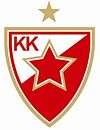 | |
| Other names | Belgrade derby |
|---|---|
| Locale |
Belgrade, |
| Teams | Partizan & Red Star |
| Statistics | |
| Meetings total | 252 (205 championship matches (139 + 66 Play-off), 15 cup matches and 32 ABA League matches) |
KK Crvena zvezda was the winner of the European Cup Winner's Cup in 1974 and 2 regional ABA League. The club has also won 17 national championships and 8 national cups.
KK Partizan was the European champion in 1992. They also won 3 Radivoj Korać Cups and 6 regional ABA League. KK Partizan is the holder of 21 national championship titles. They have also won 13 national basketball cups and 1 triple crown in 1992.
Aleksandar Nikolić Hall
The Aleksandar Nikolić Hall is a sports arena in Belgrade located in the Belgrade's municipality of Palilula. The capacity of the arena is 5,878 seats.[7] It is home terrain for both rivals. During derbies Grobari are on the east stand of the hall while Delije are concentrated on the west stand. Recently, because of frequent violent clashes between two groups, the clubs have stopped selling derby match tickets.
Statistics
|
|
Players who have played for both clubs (senior career)
|
|
Players who have played for one club in youth career and for rival club in senior career
- Aleksandar Đorđević (youth career Red Star, senior career Partizan)
- Nenad Trunić (youth career Partizan, senior career Red Star)
- Milan Preković (youth career Partizan, senior career Red Star)
- Vuk Radivojević (youth career Partizan, senior career Red Star)
- Vladimir Radmanović (youth career Partizan and Red Star, senior career Red Star)
- Miloš Mirković (youth career Partizan, senior career Red Star)
- Stefan Stojačić (youth career Partizan, senior career Red Star)
- Stevan Jelovac (youth career Partizan, senior career Red Star)
- Nemanja Bjelica (youth career Partizan, senior career Red Star)
- Đorđe Gagić (youth career Red Star, senior career Partizan)
- Petar Aranitović (youth career Red Star, senior career Partizan)
- Đorđe Majstorović (youth career Partizan and Red Star, senior career Partizan)
Players who have played for both club in youth career
- Nikola Jovanović (youth career first Red Star, than Partizan)
Played for one club and coached the rival club
- Borislav Stanković (Red Star, Partizan as player, Partizan as coach)
- Miodrag Stefanović (Red Star as player, Partizan as coach)
- Borislav Ćurčić (Red Star, Partizan as player, Partizan as coach)
- Strahinja Alagić (Red Star, Partizan as player, Red Star as coach)
- Svetislav Pešić (Partizan as player, Red Star as coach)
- Zoran Krečković (Partizan as player, Red Star as coach)
Coaches who worked at both clubs
- Aleksandar Nikolić
- Ranko Žeravica
- Zoran Slavnić
- Vladislav Lučić
- Borislav Džaković
- Duško Vujošević
- Miroslav Nikolić
Assistant coaches who worked at both clubs
- Dejan Srzić
- Veselin Matić
- Marin Sedlaček
- Predrag Jaćimović
- Petronije Zimonjić
- Milivoje Karalejić
- Saša Nikitović
- Milivoje Lazić
Coaches who worked at both clubs (youth career)
- Aleksandar Lukman
- Saša Jakovljević
- Vladimir Bošnjak
National Trophies in Five Popular Team Sports
| Year | Football | Basketball | Volleyball | Handball | Water Polo | |||||
|---|---|---|---|---|---|---|---|---|---|---|
| Championship | Cup | Championship | Cup | Championship | Cup | Championship | Cup | Championship | Cup | |
| Socialist Federal Republic of Yugoslavia | ||||||||||
| 1946 | – | – | CZ (1) | – | PAR (1) | – | – | – | – | – |
| 1947 | PAR (1) | PAR (1) | CZ (2) | – | PAR (2) | – | – | – | – | – |
| 1948 | – | CZ (1) | CZ (3) | – | – | – | – | – | – | – |
| 1949 | PAR (2) | CZ (2) | CZ (4) | – | PAR (3) | – | – | – | – | – |
| 1950 | – | CZ (3) | CZ (5) | – | PAR (4) | PAR (1) | – | – | – | – |
| 1951 | CZ (1) | – | CZ (6) | – | CZ (1) | – | – | – | – | – |
| 1952 | – | PAR (2) | CZ (7) | – | – | – | – | – | – | – |
| 1953 | CZ (2) | – | CZ (8) | – | PAR (5) | – | – | – | – | – |
| 1954 | – | PAR (3) | CZ (9) | – | CZ (2) | – | – | – | – | – |
| 1955 | – | – | CZ (10) | – | – | – | CZ (1) | – | – | – |
| 1956 | CZ (3) | – | – | – | CZ (3) | – | CZ (2) | CZ (1) | – | – |
| 1957 | CZ (4) | PAR (4) | – | – | CZ (4) | – | – | – | – | – |
| 1958 | – | CZ (4) | – | – | – | – | – | – | – | – |
| 1959 | CZ (5) | CZ (5) | – | – | – | – | – | PAR (1) | – | – |
| 1960 | CZ (6) | – | – | – | – | CZ (1) | – | – | – | – |
| 1961 | PAR (3) | – | – | – | – | PAR (2) | – | – | – | – |
| 1962 | PAR (4) | – | – | – | – | – | – | – | – | – |
| 1963 | PAR (5) | – | – | – | – | – | – | – | PAR (1) | – |
| Socialist Federal Republic of Yugoslavia | ||||||||||
| 1964 | CZ (7) | CZ (6) | – | – | – | PAR (3) | – | – | PAR (2) | – |
| 1965 | PAR (6) | – | – | – | – | – | – | – | PAR (3) | – |
| 1966 | – | – | – | – | – | – | – | PAR (2) | PAR (4) | – |
| 1967 | – | – | – | – | PAR (6) | – | – | – | – | – |
| 1968 | CZ (8) | CZ (7) | – | – | – | – | – | – | PAR (5) | – |
| 1969 | CZ (9) | – | CZ (11) | – | – | – | – | – | – | – |
| 1970 | CZ (10) | CZ (8) | – | – | – | – | – | – | PAR (6) | – |
| 1971 | – | CZ (9) | – | CZ (1) | – | PAR (4) | – | PAR (3) | – | – |
| 1972 | – | – | CZ (12) | – | – | CZ (2) | – | – | CZ (7) | – |
| 1973 | CZ (11) | – | – | CZ (2) | PAR (7) | CZ (3) | – | – | PAR (8) | PAR (1) |
| 1974 | – | – | – | – | CZ (5) | PAR (5) | – | – | PAR (9) | PAR (2) |
| 1975 | – | – | – | CZ (3) | – | CZ (4) | – | – | PAR (10) | PAR (3) |
| 1976 | PAR (7) | – | PAR (1) | – | – | – | – | – | PAR (11) | PAR (4) |
| 1977 | CZ (12) | – | – | – | – | – | – | – | PAR (12) | – |
| 1978 | PAR (8) | – | – | – | PAR (8) | – | – | – | PAR (13) | PAR (5) |
| 1979 | – | – | PAR (2) | PAR (1) | – | – | – | – | PAR (14) | PAR (6) |
| 1980 | CZ (13) | – | – | – | – | – | – | – | – | – |
| 1981 | CZ (14) | – | PAR (3) | – | – | – | – | – | – | – |
| 1982 | – | CZ (10) | – | – | – | – | – | – | – | PAR (7) |
| 1983 | PAR (9) | – | – | – | – | – | – | – | – | – |
| 1984 | CZ (15) | – | – | – | – | – | – | – | PAR (15) | – |
| 1985 | – | CZ (11) | – | – | – | – | – | – | – | PAR (8) |
| 1986 | PAR (10) | – | – | – | – | – | – | – | – | – |
| 1987 | PAR (11) | – | PAR (4) | – | – | – | – | – | PAR (16) | PAR (9) |
| 1988 | CZ (16) | – | – | – | – | – | – | – | PAR (17) | PAR (10) |
| 1989 | – | PAR (5) | – | PAR (2) | – | PAR (6) | – | – | – | – |
| 1990 | CZ (17) | CZ (12) | – | – | PAR (9) | PAR (7) | – | – | – | PAR (11) |
| 1991 | CZ (18) | – | – | – | PAR (10) | CZ (5) | – | – | – | PAR (12) |
| Federal Republic of Yugoslavia | ||||||||||
| 1992 | CZ (19) | PAR (6) | PAR (5) | PAR (3) | – | – | – | – | CZ (1) | PAR (13) |
| 1993 | PAR (12) | CZ (13) | CZ (13) | – | – | CZ (6) | PAR (1) | PAR (4) | CZ (2) | PAR (14) |
| 1994 | PAR (13) | PAR (7) | CZ (14) | PAR (4) | – | – | PAR (2) | PAR (5) | – | PAR (15) |
| 1995 | CZ (20) | CZ (14) | PAR (6) | PAR (5) | – | – | PAR (3) | CZ (2) | PAR (18) | PAR (16) |
| 1996 | PAR (14) | CZ (15) | PAR (7) | – | – | – | CZ (3) | CZ (3) | – | – |
| 1997 | PAR (15) | CZ (16) | PAR (8) | – | – | CZ (7) | CZ (4) | – | – | – |
| 1998 | – | PAR (8) | CZ (15) | – | – | – | CZ (5) | PAR (6) | – | – |
| 1999 | PAR (16) | CZ (17) | – | PAR (6) | – | CZ (8) | PAR (4) | – | – | – |
| 2000 | CZ (21) | CZ (18) | – | PAR (7) | – | – | – | – | – | – |
| 2001 | CZ (22) | PAR (9) | – | – | – | – | – | PAR (7) | – | – |
| 2002 | PAR (17) | CZ (19) | PAR (9) | PAR (8) | – | – | PAR (5) | – | PAR (19) | PAR (17) |
| 2003 | PAR (18) | – | PAR (10) | – | CZ (6) | – | PAR (6) | – | – | – |
| Serbia and Montenegro | ||||||||||
| 2004 | CZ (23) | CZ (20) | PAR (11) | CZ (4) | – | – | CZ (6) | CZ (4) | – | – |
| 2005 | PAR (19) | – | PAR (12) | – | – | – | – | – | – | – |
| 2006 | CZ (24) | CZ (21) | PAR (13) | CZ (5) | – | – | CZ (7) | – | – | – |
| Serbia | ||||||||||
| 2007 | CZ (25) | CZ (22) | PAR (14) | – | – | – | CZ (8) | PAR (8) | PAR (20) | PAR (18) |
| 2008 | PAR (20) | PAR (10) | PAR (15) | PAR (9) | CZ (7) | – | CZ (9) | PAR (9) | PAR (21) | PAR (19) |
| 2009 | PAR (21) | PAR (11) | PAR (16) | PAR (10) | – | CZ (9) | PAR (7) | – | PAR (22) | PAR (20) |
| 2010 | PAR (22) | CZ (23) | PAR (17) | PAR (11) | – | – | – | – | PAR (23) | PAR (21) |
| 2011 | PAR (23) | PAR (12) | PAR (18) | PAR (12) | PAR (11) | CZ (10) | PAR (8) | – | PAR (24) | PAR (22) |
| 2012 | PAR (24) | CZ (24) | PAR (19) | PAR (13) | CZ (8) | – | PAR (9) | PAR (10) | PAR (25) | PAR (23) |
| 2013 | PAR (25) | – | PAR (20) | CZ (6) | CZ (9) | CZ (11) | – | PAR (11) | CZ (3) | CZ (1) |
| 2014 | CZ (26) | – | PAR (21) | CZ (7) | CZ (10) | CZ (12) | – | – | CZ (4) | CZ (2) |
| 2015 | PAR (26) | – | CZ (16) | CZ (8) | CZ (11) | – | – | – | PAR (26) | – |
| 2016 | CZ (27) | PAR (13) | CZ (17) | – | CZ (12) | CZ (13) | – | – | PAR (27) | PAR (24) |
See also
- List of association football rivalries
- List of FK Partizan players
- List of Red Star Belgrade footballers
References
- ↑ "Da nema Rumuna, Srbi bi bili gospodari regiona" (in Serbian). The Sportal. 14 January 2013.
- ↑ "Pola Srbije za Crvenu zvezdu!" (in Serbian). Večernje Novosti. 27 February 2008. Retrieved 2010-12-06.
- ↑ THE LIST: The greatest rivalries in club football, Nos 10–1
- ↑ Bojanic, Zivko (2007). BSK – Jugoslavija the first eternal derby. ISBN 9788685627071. Retrieved 12 March 2011.
- ↑ Stadion at Red Star official website.
- ↑ Stadion at Partizan official website.
- ↑ http://www.tasmajdan.rs/hala-aleksandar-nikolic
External links
| Wikimedia Commons has media related to Eternal derby (Serbia). |
